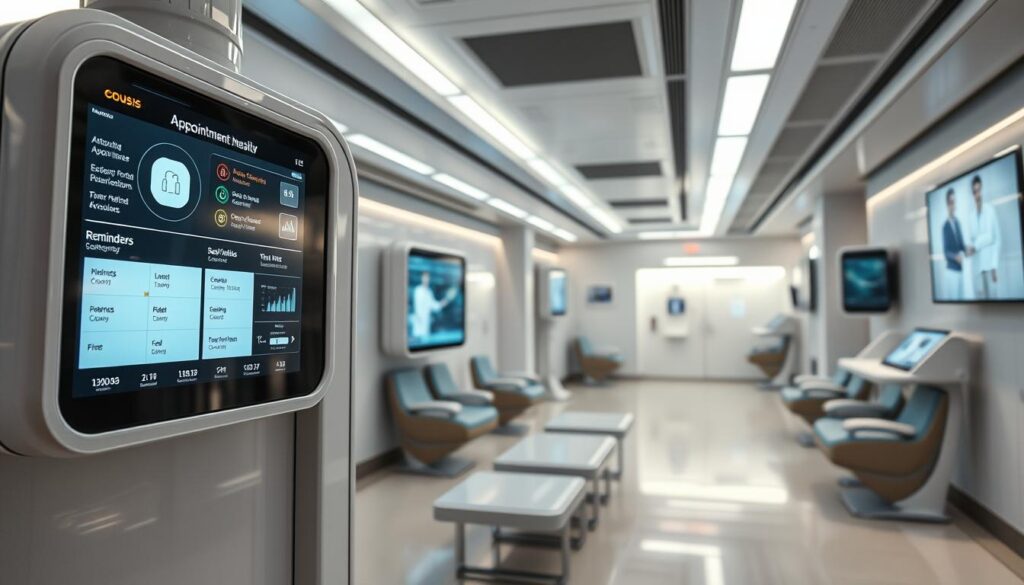Streamlining your appointment scheduling and patient communication can have a significant impact on your business efficiency. In this comprehensive guide, we’ll explore the easiest ways to automate appointment reminders and unlock the benefits of this powerful tool. From reducing no-shows to improving patient engagement and satisfaction, you’ll learn how to leverage automated reminders to elevate your practice’s performance.
Key Takeaways
- Automate appointment reminders to save time and reduce no-shows
- Improve patient engagement and satisfaction with effective reminder systems
- Streamline your practice’s workflows and boost overall efficiency
- Leverage scheduling software and calendar integration to simplify the process
- Customize reminder messages to enhance communication with patients
Why Automated Appointment Reminders Matter
Automated appointment reminders are a game-changer in the healthcare industry, offering numerous benefits for both patients and healthcare providers. These automated systems play a crucial role in reducing no-shows and last-minute cancellations, ultimately improving patient engagement and satisfaction.
Reducing No-Shows and Cancellations
One of the primary advantages of automated appointment reminders is their ability to minimize no-shows and late cancellations. Patients often forget or overlook scheduled appointments, leading to missed opportunities for healthcare providers. Automated appointment confirmation systems can send timely reminders, allowing patients to easily confirm, reschedule, or cancel their appointments, ensuring better utilization of healthcare resources.
Improving Patient Engagement and Satisfaction
By keeping patients informed and involved in their appointment schedule, automated patient communication systems contribute to enhanced patient engagement and satisfaction. Patients feel more empowered and appreciative when they receive regular updates and have the ability to manage their appointments seamlessly. This improved engagement leads to better adherence to treatment plans, increased trust in the healthcare provider, and overall higher patient satisfaction.
| Key Benefits of Automated Appointment Reminders | Impact |
|---|---|
| Reduced no-shows and late cancellations | Improved utilization of healthcare resources and reduced financial losses |
| Increased patient engagement and satisfaction | Better treatment adherence and trust in healthcare providers |
Automated appointment reminders have become an essential tool in the healthcare industry, driving improved patient communication, engagement, and satisfaction. By leveraging these technology-driven solutions, healthcare providers can maximize their efficiency and deliver a superior patient experience.
Choosing the Right Appointment Reminder Software
When it comes to automating your appointment reminders, selecting the right software is crucial for optimal efficiency and patient communication. The healthcare industry has witnessed a remarkable shift towards scheduling software, calendar management, and healthcare automation solutions, all of which play a vital role in enhancing medical practice efficiency.
To choose the best appointment reminder software for your practice, consider the following key features:
- Seamless integration with your existing calendar or scheduling software to ensure a streamlined workflow.
- Customizable reminder messages that allow you to tailor the content, tone, and frequency to your patients’ preferences.
- Robust reporting and analytics capabilities to track the effectiveness of your appointment reminders and identify areas for improvement.
- Compatibility with various communication channels, such as SMS, email, and voice calls, to cater to your patients’ diverse communication needs.
- Secure data storage and compliance with healthcare regulations to protect patient confidentiality.
By carefully evaluating these features and aligning them with your practice’s unique needs, you can find the perfect appointment reminder software to enhance patient engagement, reduce no-shows, and optimize your healthcare automation efforts.
“Automating appointment reminders has significantly improved our patient retention and satisfaction. It’s a game-changer for our practice.”
– Dr. Sarah Johnson, Medical Director
How to Automate Appointment Reminders
Automating appointment reminders is a game-changer for healthcare providers, streamlining operations and improving patient engagement. By setting up an automated system, you can ensure your patients receive timely reminders about their upcoming visits, reducing the likelihood of no-shows and last-minute cancellations.
Setting Up Appointment Reminders
To get started, you’ll need to choose a reliable appointment reminder software or service that integrates seamlessly with your existing calendar and patient management systems. Look for features like customizable reminder messages, multiple communication channels (email, SMS, voice), and detailed reporting to track the effectiveness of your automated reminders.
Customizing Reminder Messages
Crafting personalized and engaging reminder messages is crucial for maximizing the impact of your automated appointment reminders. Consider including the patient’s name, the date and time of their appointment, and any relevant details like the provider’s name or the purpose of the visit. You can also add a touch of empathy by acknowledging the patient’s time and expressing your appreciation for their visit.
Remember to test different message variations and monitor user engagement to find the most effective approach for your practice. By continuously refining your automated reminder messages, you can enhance the patient experience and ensure a higher rate of appointment confirmation.
Automating your appointment reminder process is a simple yet powerful way to streamline your healthcare operations and improve patient satisfaction. By setting up a comprehensive system and customizing your messaging, you can ensure your patients are informed and engaged, leading to better outcomes for both your practice and your patients.
Best Practices for Effective Appointment Reminders
Crafting effective appointment reminders is key to reducing no-shows and improving patient communication. By following best practices, healthcare providers can maximize the impact of their automated reminders and ensure high patient engagement.
Timing and Frequency of Reminders
The timing and frequency of appointment reminders can make a significant difference in their effectiveness. Experts recommend sending reminders at multiple touchpoints, such as:
- A week before the scheduled appointment
- A few days prior to the appointment
- The day before the appointment
- On the day of the appointment
This multi-touch approach helps reinforce the appointment details and reduces the likelihood of patients forgetting or missing their scheduled visit. Additionally, the frequency of reminders should be tailored to your patient population and their preferences to maximize engagement and minimize annoyance.
| Reminder Timing | Potential Benefits |
|---|---|
| 1 week prior | Allows patients to plan and prepare |
| 3 days prior | Helps prevent last-minute cancellations |
| 1 day prior | Ensures patients have the most up-to-date information |
| Same day | Reduces no-shows and last-minute changes |
By optimizing the timing and frequency of your automated appointment reminders, you can deliver a superior patient experience and improve the overall efficiency of your practice.
Integrating Appointment Reminders with Your Calendar
Streamlining your healthcare operations involves seamlessly integrating your automated appointment reminders with your existing calendar management system. This integration ensures a smooth workflow and accurate scheduling, ultimately enhancing patient communication and satisfaction.
By syncing your scheduling software with your calendar, you can effortlessly deliver timely reminders to patients, keeping them informed and reducing the likelihood of missed appointments. This integration also allows you to maintain an accurate record of all scheduled visits, making it easier to manage your healthcare automation efforts.
Key Benefits of Integrating Appointment Reminders with Your Calendar
- Improved scheduling accuracy and efficiency
- Reduced administrative burden through automated reminders
- Enhanced patient engagement and satisfaction
- Streamlined workflow for healthcare providers
To effectively integrate your appointment reminders with your calendar, consider the following steps:
- Evaluate your current calendar management system and ensure it’s compatible with your scheduling software.
- Configure your scheduling software to seamlessly sync with your calendar, allowing for automatic updates and reminders.
- Customize the reminder messages to provide patients with all the necessary information, such as appointment details, location, and any special instructions.
- Monitor the integration to ensure it’s functioning smoothly and make any necessary adjustments to optimize the process.
| Feature | Benefit |
|---|---|
| Automated Appointment Reminders | Reduces no-shows and cancellations, improving patient engagement and satisfaction |
| Calendar Integration | Streamlines scheduling and ensures accurate record-keeping |
| Customizable Reminder Messages | Enhances patient communication and provides essential information |
By seamlessly integrating your appointment reminders with your calendar, you can optimize your healthcare automation efforts, streamline your scheduling process, and enhance the overall patient experience.
Tracking and Analyzing Appointment Reminder Results
Optimizing your medical practice’s efficiency is crucial, and one key component is effectively managing patient appointments. By tracking and analyzing the performance of your automated appointment reminders, you can continuously refine your patient communication strategies to reduce no-shows and enhance overall patient engagement.
To start, monitor your appointment reminder metrics, such as the open rates, click-through rates, and the number of confirmed appointments. This data will provide valuable insights into the effectiveness of your current reminder system and help you identify areas for improvement.
Evaluating Reminder Effectiveness
Take a deeper dive into your reminder data to uncover patterns and trends. Consider the following factors:
- Timing of reminders: Analyze the impact of sending reminders at different intervals (e.g., one week, 48 hours, 24 hours) before the scheduled appointment.
- Reminder frequency: Determine the optimal number of reminders to send without overwhelming patients.
- Message content: Evaluate the effectiveness of various reminder message formats, tones, and call-to-actions.
| Metric | Baseline | Recent Performance | Improvement |
|---|---|---|---|
| Appointment No-Show Rate | 15% | 10% | -5% |
| Patient Engagement (Confirmed Appointments) | 80% | 90% | +10% |
| Reminder Open Rate | 65% | 75% | +10% |
By closely monitoring these metrics, you can identify opportunities to optimize your medical practice’s efficiency, reduce appointment no-shows, and enhance patient engagement – all key factors in maintaining a thriving healthcare business.
“Automating appointment reminders has been a game-changer for our practice. We’ve seen a significant reduction in no-shows and improved patient satisfaction.” – Dr. Emily Wilkins, Medical Director
How to Automate Appointment Reminders for Better Patient Communication
Automating your appointment reminders can have a profound impact on your patient communication, leading to enhanced patient engagement, satisfaction, and loyalty. By leveraging the power of healthcare automation, you can streamline your appointment reminder process, ensuring your patients are always kept informed and empowered.
One of the key benefits of automated appointment reminders is their ability to reduce no-shows and last-minute cancellations. When patients receive timely and personalized reminders, they are more likely to remember their scheduled appointments, leading to improved attendance rates and better overall clinic operations.
- Enhance patient communication with automated reminders
- Improve patient engagement and satisfaction
- Leverage healthcare automation for efficient patient management
Moreover, automated appointment reminders can foster stronger patient relationships by demonstrating your commitment to their care. Patients appreciate the attentive and personalized service, which can translate into increased trust, loyalty, and positive word-of-mouth referrals.
“Automating appointment reminders has revolutionized our patient communication, allowing us to provide a seamless and personalized experience for our patients.”
By integrating automated appointment reminders into your healthcare workflow, you can streamline your operations, improve patient outcomes, and enhance the overall patient experience. This powerful healthcare automation tool can be a game-changer for your practice, setting you up for success in the ever-evolving landscape of patient-centered care.
Leveraging Automated Reminders for Healthcare Efficiency
In the fast-paced world of healthcare, efficiency is paramount. Automated appointment reminders can be a powerful tool for healthcare providers to enhance their productivity and streamline their workflows. By reducing missed appointments and optimizing patient communication, these innovative technologies can significantly contribute to the overall effectiveness of medical practices.
Reducing Missed Appointments
One of the primary benefits of automated appointment reminders is their ability to decrease the number of missed appointments, or no-shows. Healthcare automation solutions can send timely reminders to patients, helping them stay informed and prepared for their scheduled visits. This not only improves medical practice efficiency but also enhances the patient experience by ensuring they don’t forget about their appointments.
Streamlining Workflows
In addition to reducing no-shows, automated appointment reminders can significantly streamline the workflow within a healthcare organization. By automating the tedious task of manually contacting patients, providers can free up valuable time and resources, allowing them to focus on delivering high-quality care. This increased efficiency can translate into cost savings and improved medical practice efficiency, ultimately benefiting both the practice and the patients.
Overall, the implementation of automated appointment reminders can be a game-changer for healthcare providers, driving healthcare automation and enhancing the overall productivity and effectiveness of their practices.

The Benefits of Automating Appointment Reminders
Automating appointment reminders can provide a myriad of benefits to healthcare providers and their patients. By leveraging scheduling software and calendar management tools, practices can effortlessly send automated reminders, reducing the burden on administrative staff and ensuring patients receive timely notifications. These automated reminders can lead to a significant decrease in no-shows and cancellations, ultimately improving overall practice efficiency and patient engagement.
Automated appointment reminders also enhance patient communication, fostering a stronger relationship between healthcare providers and their patients. Patients appreciate the convenience of receiving timely reminders, leading to increased satisfaction and loyalty. Furthermore, the integration of these automated systems with a practice’s calendar can streamline workflows, allowing staff to focus on delivering exceptional care rather than manually managing appointment logistics.
By embracing the power of healthcare automation, medical practices can experience a range of benefits, from improved business success to enhanced patient outcomes. Automating appointment reminders is a strategic step towards optimizing operations, reducing administrative tasks, and providing a seamless patient experience – all of which contribute to the overall success and growth of a healthcare organization.

